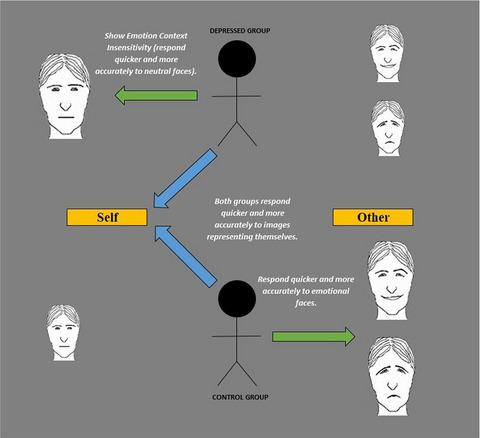当前位置:
X-MOL 学术
›
Eur. J. Neurosci.
›
论文详情
Our official English website, www.x-mol.net, welcomes your
feedback! (Note: you will need to create a separate account there.)
Self-referential processing and emotion context insensitivity in major depressive disorder.
European Journal of Neuroscience ( IF 2.7 ) Pub Date : 2020-05-16 , DOI: 10.1111/ejn.14782 Lucy McIvor 1, 2 , Jie Sui 3 , Tina Malhotra 4 , David Drury 2 , Sanjay Kumar 2
European Journal of Neuroscience ( IF 2.7 ) Pub Date : 2020-05-16 , DOI: 10.1111/ejn.14782 Lucy McIvor 1, 2 , Jie Sui 3 , Tina Malhotra 4 , David Drury 2 , Sanjay Kumar 2
Affiliation

|
We examined whether differential self‐perception influences the salience of emotional stimuli in depressive disorders, using a perceptual matching task in which geometric shapes were arbitrarily assigned to the self and an unknown other. Participants associated shapes with personal labels (e.g. “self” or “other”). Each geometric shape additionally contained a happy, sad or neutral line drawing of a face. Participants then judged whether shape‐label pairs were as originally shown or re‐paired, whilst facial emotion was task‐irrelevant. The results showed biased responses to self‐relevant stimuli compared to other‐relevant stimuli, regardless of facial emotion, for both control and depressed participants. This was reflected in sensitivity (d′) and drift rate (v) measures, suggesting that self‐bias and a bias towards emotion may reflect different underlying processes. We further computed bias scores by subtracting the “neutral” value of each measure (acting as baseline) from the “happy” and “sad” values of each measure, indexing an “emotional bias” (EB) score for “self” and “other” separately. Compared to control participants, depressed participants exhibited reduced “happy” and “sad” emotional biases, regardless of the self‐relevance of stimuli. This finding indicates that depressed participants may exhibit generalised Emotion Context Insensitivity (ECI), characterised by hyopoattention to both positive and negative information, at short stimulus presentations. The implications of this are discussed.
中文翻译:

严重抑郁症患者的自我指称处理和情感背景不敏感。
我们使用感知匹配任务(其中将几何形状任意分配给自我和未知对象),研究了差异性自我感知是否会影响抑郁症患者情绪刺激的显着性。参与者将形状与个人标签(例如“自己”或“其他”)相关联。每个几何形状还包含一张高兴,悲伤或中性的脸部线条图。然后,参与者判断形状标签对是否如最初所示或重新配对,而面部表情与任务无关。结果显示,与其他相关刺激相比,无论是面部表情还是情绪控制者,其对自我相关刺激的反应都存在偏差。这反映在灵敏度(d ')和漂移率(v)措施,表明自我偏见和对情感的偏见可能反映了不同的潜在过程。我们通过从每个量度的“快乐”和“悲伤”值中减去每个量度(作为基线)的“中性”值,并为“自我”和“其他”。与对照组相比,沮丧的参与者表现出减少的“快乐”和“悲伤”情绪偏见,而与刺激的自我相关性无关。这一发现表明,抑郁的参与者可能会在短暂的刺激表现中表现出普遍的情绪情境不敏感性(ECI),其特征是对正和负信息都低下注意力。讨论了其含义。
更新日期:2020-05-16
中文翻译:

严重抑郁症患者的自我指称处理和情感背景不敏感。
我们使用感知匹配任务(其中将几何形状任意分配给自我和未知对象),研究了差异性自我感知是否会影响抑郁症患者情绪刺激的显着性。参与者将形状与个人标签(例如“自己”或“其他”)相关联。每个几何形状还包含一张高兴,悲伤或中性的脸部线条图。然后,参与者判断形状标签对是否如最初所示或重新配对,而面部表情与任务无关。结果显示,与其他相关刺激相比,无论是面部表情还是情绪控制者,其对自我相关刺激的反应都存在偏差。这反映在灵敏度(d ')和漂移率(v)措施,表明自我偏见和对情感的偏见可能反映了不同的潜在过程。我们通过从每个量度的“快乐”和“悲伤”值中减去每个量度(作为基线)的“中性”值,并为“自我”和“其他”。与对照组相比,沮丧的参与者表现出减少的“快乐”和“悲伤”情绪偏见,而与刺激的自我相关性无关。这一发现表明,抑郁的参与者可能会在短暂的刺激表现中表现出普遍的情绪情境不敏感性(ECI),其特征是对正和负信息都低下注意力。讨论了其含义。































 京公网安备 11010802027423号
京公网安备 11010802027423号